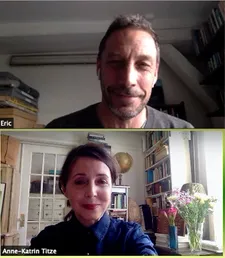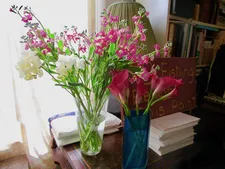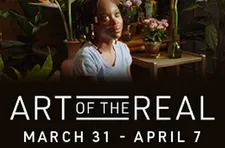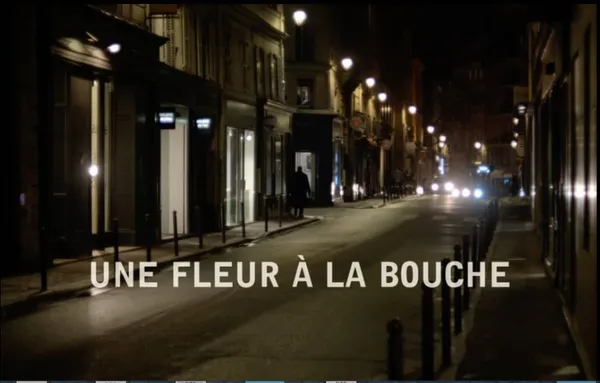In my conversation with Eric Baudelaire, the director of When There Is No More Music to Write, and Other Roman Stories (a highlight of Film at Lincoln Center’s ninth edition of Art of the Real and Cinéma du réel in Paris, where Mathieu Amalric’s Zorn III (2018 - 2022) also screened) and A Flower In The Mouth (Une Fleur À La Bouche) co-written with Anne-Louise Trividic, starring Oxmo Puccino and Dali Benssalah, we discussed his work with editor Claire Atherton, music historian Maxime Guitton connecting him to composer Alvin Curran, a Luigi Pirandello play, Michelangelo Antonioni’s Zabriskie Point, Robert Musil and Young Törless (Der junge Törless).
 |
| Éric Baudelaire with Anne-Katrin Titze on When There Is No More Music To Write, And Other Roman Stories: “The flower vendor in Rome has been a subject of preoccupation for me since 2017 …” |
From Paris, before coming to New York to present When There Is No More Music To Write, and Other Roman Stories, Éric Baudelaire joined me on Zoom for an in-depth conversation on his two latest films.
Anne-Katrin Titze: Let’s start with a motif that I noticed after seeing A Flower In The Mouth, which premiered in Berlin earlier this year. That is, how you were dealing with flowers in the most unusual and interesting ways. You can imagine my surprise watching When There Is No More Music to Write, and Other Roman Stories and in the beginning is a florist. Is that …
Éric Baudelaire: … coincidence! You notice those two flower bouquets right behind you near the window. So there’s a constant flower theme here! No, it’s a coincidence because actually the two films surprisingly have very different temporalities. The flower vendor in Rome has been a subject of preoccupation for me since 2017 when I went to Rome to start working on this film.
Whereas the Pirandello play has been in the back of my mind for a good 20 years because of a brief experience in theatre and we put on this play [The Man With The Flower In His Mouth]. It was in my early twenties and I’ve been thinking about this play for a long time but I really only got to thinking about adapting it a couple of years ago. So these two flower stories were sort of overlapping in my mind subconsciously, but it wasn’t a conscious thing.
Of course now that I’m starting to tour festivals with both films, people have also pointed out the fact that there’s a family history with flowers being both beautiful and deadly. Maybe that’s going on psychoanalytically and I’m not perfectly aware of that.
AKT: Lacan would have jumped on that for sure! It’s easy to remember, to connect your name to your films is no problem!
 |
| Éric Baudelaire: “You notice those two flower bouquets right behind you near the window. So there’s a constant flower theme here!” Photo: Anne-Katrin Titze |
ÉB: There we go!
AKT: What was it about the florist’s story that fascinated you? There’s a line you quote from his report where he says:” I can absolutely confirm that in the days before the attack I noticed nobody on that corner.” The noticing the not-there is so interesting in the context of what happened after. I think a lot in your films is about noticing the absence, the what is not, the gaps.
ÉB: The language in the deposition the flower vendor gives - I recognize this language of noticing an absence. It’s very much police language, because it’s the result of an interrogation. Even though this is a police report that dates back to 1978, this specific sentence construction is very reminiscent of work I did for another film, which we showed at the Whitney Biennial a few years ago, called Also Known as Jihadi. It’s a film I constructed almost entirely from police reports, interrogations, and judicial documents.
So when I came across this deposition from the Roman police in 1978 I was familiar with this sort of strange language confirming the absence of having noticed something. It’s very specific. I was curious about this story of the flower vendor and I’ve been thinking about it for a while because it’s emblematic of the kinds of things that I’m interested in, which is this sort of poetic moment in history where you find that the Red Brigades who are on the verge of committing what is going to become a very bloody, very violent kidnapping of a former head of state, but they would go through the trouble of trying to make sure that the flower vendor isn’t in danger.
![Éric Baudelaire: “The Pirandello play [The Man With the Flower In His Mouth] has been in the back of my mind for a good 20 years because of a brief experience in theatre …”](/images/newsite/Une_fleur_a_la_bouche_A_Flower_in_the_Mouth_2_225.webp) |
| Éric Baudelaire: “The Pirandello play [The Man With the Flower In His Mouth] has been in the back of my mind for a good 20 years because of a brief experience in theatre …” |
At the same time there’s this awareness of the operational details to spare a flower vendor, but at the same time they are about to assassinate four carabinieri the next day and then 55 days later they are going to brutally kill Aldo Moro, who was their prisoner and maybe in a broader sense commit an enormous political blunder which is to put an end to this ten-year-long student and workers movement in Italy which had become more and more radical. It is sort of the culminating point which is politically disastrous. Attention to detail to save the florist on the way to committing atrocities and making devastating political mistakes.
AKT: Also the perspective of the florist. The realization that they slashed the tires in order to save the florist. This is the stuff of folktales. The horror at something which turns out to be actually preventing much greater harm and horror.
ÉB: Right! So I actually hired a private detective to find the family of the florist to see if they would tell me anything. I started working on this in 2018 in Rome, which coincidentally was the 40th anniversary of the event, which turned out to be the worst possible time to research this story because everybody had been over solicited by numerous TV journalists.
Contrary to this historical period in France or perhaps in the United States, the wounds are still gaping open in Italy. It’s still a very very fraught period and seems very present. People on both sides are still extraordinarily sensitive about all of this. It’s not dealt with as a historical event, it’s dealt with as an unsolved wound. I found it was impossible to do what I had done ten years before with a film that was also interested in the radical left, in Japan, to actually talk to people and get close to them. It became clear to me in Rome that I had to find a different way here.
 |
| Éric Baudelaire: “The language in the deposition the flower vendor gives - I recognise this language of noticing an absence.” |
AKT: Did you ever find the flower vendor’s family?
ÉB: I found the son. The florist died in 2000. What was interesting, I was able to learn that the florist had died before it was well-known that the Red Brigades had in effect slashed his tires. In other words, he never really knew why he survived. There was many different theories, maybe it was vandalism, as he says in the film. It’s only in 2005 or 2006 that the leader of the Red Brigades in Rome, Mario Moretti, talked about this openly in an interview. So he died without knowing why he hadn’t been there that morning.
I tried to reach his son, who’s a taxi driver in Rome and he wouldn’t talk to me either. That was the coincidence that put me on the path toward Alvin Curran. Because the film was sort of drying up, the film I intended to make evaporated and I remained with the elements that are in the first 15 minutes of the film concerning the Red Brigades. Then I crossed the path of Alvin Curran through a friend, Maxime Guitton, who is a music historian and who was also a resident at the Villa Medici, at The French Academy in Rome. He was doing research on Alvin.
AKT: For the second part of the triptych, A Lost Score, he is the one who found the score?
 |
| Art Of The Real - Film at Lincoln Center |
ÉB: Exactly.
The Film at Lincoln Center screening of When There Is No More Music To Write, And Other Roman Stories takes place on Thursday, April 7 at 8:30pm (Q&A with Éric Baudelaire), preceded by Maria Rojas Arias’s Abrir Monte.
The Art Of The Real runs through April 7.
Coming up: A Lost Score and what happened with Michelangelo Antonioni’s Zabriskie Point, Alvin Curran on the possible and impossible, my Robert Musil assignment from Mathieu Amalric, and Éric reading Young Törless in the 1990s.






















